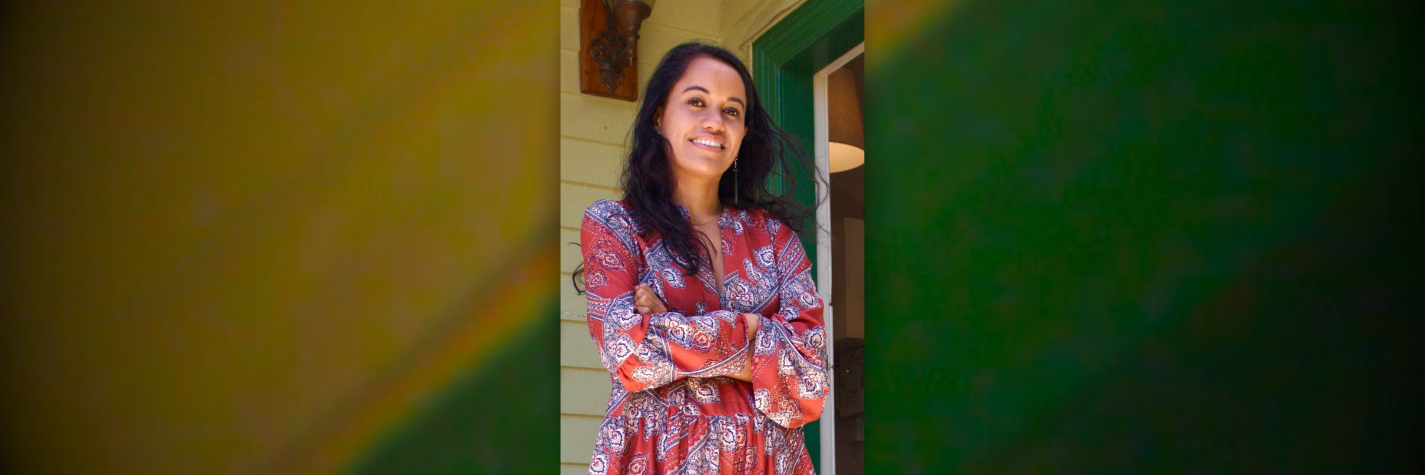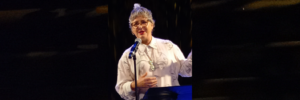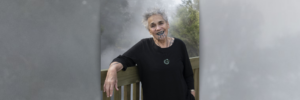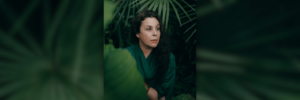
Shilo Kino (Ngāpuhi, Ngāti Te Ata, Ngāti Maniapoto) is a writer residing in Tāmaki Makaurau. She has worked for Marae, Newsroom, North and South, The Spinoff, The Guardian and Pantograph Punch as a journalist. In 2018 Shilo was awarded a place on the Māori Literature Trust writers’ incubator, Te Papa Tupu. In 2020, she published her debut novel, The Pōrangi Boy (Huia), which won the Young Adult Fiction Award at the 2021 New Zealand Book Awards.In 2021 she studied a full-time immersion te reo Māori course at Te Wānanga o Takiura, an experience she documented in the podcast Back to Kura.In 2024 she released her second book, All That We Know (Moa Press), which deals with activism, social media, and colonisation.
Congratulations on the release of your new pukapuka All That We Know, which has been doing very well in bookstores all over the motu! Sometimes writers talk about their book as if it is something they’ve birthed a struggle as well as a gift. If you were to think of your book this way, who are its whanaunga? Who helped you bring this book into the world?
Ka nui te mihi i a koe, thank you e hoa. This is a beautiful question and one that I’ve never been asked before. Writing this book has truly been the greatest gift for me. I now understand the meaning of writing being a form of rongoā or medicine. I wrote ATWK when I was struggling to live with contradictions of my own identity, intersections of not feeling enough. But as I moved through the weaving of this story, I began to find answers to my questions but not in the way I thought. Through writing a world of characters, I was able to confront my own grief, reconcile burning questions and be at peace with all the contradictions of who I am, to love all parts of myself.
There are many whanaunga who helped bring this book into the world, especially wāhine Māori. Lately, I have been reflecting on how wāhine Māori have always been at the forefront of every social justice movement when it comes to our language, land, and rights. Activists, scholars, writers, critical thinkers, pioneers, and reo champions who have spent lifetimes advocating and fighting. I think about how I wouldn’t have what I have—my reo, my knowledge, the ability to write and publish stories—without these pioneers. I also think about the wahine in my own life—the wahine who surround me, the wahine who came before me, the wahine who raised me, and the generations of wahine who will come after me. They, too, are the whanaunga to this book.
What tikanga or kawa do you apply to your writing process to ensure that you keep both yourself and your readers safe?
I try to karakia every morning, night, and before I write. I find that this practice is beneficial for me, not just in writing but as a daily ritual. In terms of writing, it helps keep me connected to myself and to what I am creating.
There has been much talk about the process behind finalising a Publisher for this novel, via your agent. Can you tell us how this process made you feel? How has the journey to publish this book differed from your first book The Pōrangi Boy?
I feel very blessed to have published my first book, The Pōrangi Boy, with Huia Publishers. I was on the Te Papa Tupu programme and this played a huge role in giving me the tools I needed to bring my first book to life. The publishing process was straightforward with Huia. I never expected The Pōrangi Boy to do as well as it did, and even three years after its release, it’s still being used in schools across the country. I’m very grateful for that and for Huia.
All That We Know was my first adult fiction book which I spent about two-three years writing. The publishing process was very different. When I finished the first draft, I decided to reach out to Kate at Moa Press because I loved the work they were publishing, like The Bone Tree and Amma. I reached out to another publisher, and before long, both were bidding for the manuscript. I had no idea what to do. I quickly Googled agents, found one in the UK and emailed her for help. My agent and I had a meeting while I was sitting in the backseat of my friends car on the way to Raglan lol. She then took over the process which was a relief. I called some tuakana for advice too but in the end, I chose Moa Press because I genuinely believe they are publishing some of the best fiction and they do so with heart.
I think for me it’s a sign of how hungry the world is for indigenous stories. Although both processes were vastly different, I feel equally as proud.
If this pukapuka had a soundtrack, what would be on the playlist?
Māreikura – Modern Māori Quartet (With a song title like that, how could I not?)
Hiwa i te Rangi – Maisey Rika
Tū mai te Reo – TOHU
Ngoi – Pātea Māori Club
35 – Rob Ruha
Kia kaha Te reo Māori!
What are your dreams for this book?
I believe in the healing power of stories. I believe that stories should make us uncomfortable—they should push us, challenge our beliefs, and leave us with questions. My hope is that All That We Know will do that.
And I hope All That We Know finds its way to the person it is meant for.
What tips do you have for building relationships in the Māori writing community?
I don’t really have specific tips for this because, honestly, I’m figuring it out as I go. I’m incredibly grateful for tuakana like Anahera, Nadine, and Hinemoa—and I hope I can be that tuakana for anyone who needs a safe space.
Which book by a Māori author have you read lately that you loved and what did you love about it?
Kawai: A Tree of Nourishment by Monty Soutar!!
Firstly, what a taonga this pukapuka is. I loved the character Hine and how she challenged everything and everyone—from her husband to the tohunga. I felt so much of her rage and grief.
The te reo Māori throughout the book is poetic and beautiful. The parts about the muskets were chilling—it felt like I was right there.
I don’t think many people realise how lucky we are to have access to this kind of mātauranga, a portal to a world we are all yearning to know and understand. Reading Soutar’s work feels like a true privilege.
What advice do you have for emerging Māori writers?
There are many different ways to write and to be a writer. Everyone’s haerenga is different. You don’t need to be published to be a writer. If you write, you are a writer.
Me maumahara koe, he kākano koe i ruia mai i Rangiātea. You are a seed sown in the heavens and born of greatness. Our stories are unique and have the power to heal the world. We are the vessel and instrument for many untold stories.
Focus on your own voice and your own experiences. Just start writing and the words will come.




